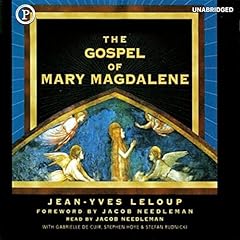
Reading Judas
The Gospel of Judas and the Shaping of Christianity
No se pudo agregar al carrito
Solo puedes tener X títulos en el carrito para realizar el pago.
Add to Cart failed.
Por favor prueba de nuevo más tarde
Error al Agregar a Lista de Deseos.
Por favor prueba de nuevo más tarde
Error al eliminar de la lista de deseos.
Por favor prueba de nuevo más tarde
Error al añadir a tu biblioteca
Por favor intenta de nuevo
Error al seguir el podcast
Intenta nuevamente
Error al dejar de seguir el podcast
Intenta nuevamente
 Exclusivo para miembros Prime: ¿Nuevo en Audible? Obtén 2 audiolibros gratis con tu prueba.
Exclusivo para miembros Prime: ¿Nuevo en Audible? Obtén 2 audiolibros gratis con tu prueba.
Elige 1 audiolibro al mes de nuestra inigualable colección.
Acceso ilimitado a nuestro catálogo de más de 150,000 audiolibros y podcasts.
Accede a ofertas y descuentos exclusivos.
Premium Plus se renueva automáticamente por $14.95 al mes después de 30 días. Cancela en cualquier momento.
Compra ahora por $12.60
-
Narrado por:
-
Karen L. King
The recently unearthed Gospel of Judas is a source of fascination for biblical scholars and lay Christians alike. Now two leading experts on the Gnostic gospels tackle the important questions posed by its discovery, including: How could any Christian imagine Judas to be Jesus' favorite? And what kind of vision of God does the author offer? Working from Karen L. King's brilliant new translation, Elaine Pagels and King provide the context necessary for considering its meaning. Reading Judas plunges into the heart of Christianity itself and will stand as the definitive look at the gospel for years to come.©2007 Elaine Pagels and Karen L. King; (P)2007 Penguin Audio, a member of Penguin Group (USA) Inc. All rights reserved.
Los oyentes también disfrutaron:




















Las personas que vieron esto también vieron:











I will not repeat my general comments on Elaine Pagels' work which can be found in my review of her book on Revelations. Suffice it to say that, once again, Pagels, this time with King, helps the modern reader gain some insight into a puzzling, even alienating, early Christian text and the context in which it was written.
The authors make clear that the text was NOT authored by Judas Iscariot, but rather was written around 150 CE following a tradition in which it was common practice to write under the name of a prophet, disciple or other notable figure as an indication of a school of thought. The document was not intended, nor was it understood, to reflect a literal description of historical events in the life of Jesus.
So what is the value of such of a document to a modern Christian or student of religion? And why, of all people, would the author of the document have chosen Judas Iscariot as the masthead for the writing? In the best tradition of historical analysis, Pagels/King show us how the Gospel, and other concurrent Christian texts, such as the the Gospel of Philip, the Gospel of Truth, Treatise on the Resurrection and the Apocalypse of Peter, can reveal much about the social and theological crises confronted by 2nd century Christianity which, at that time, was far from a unified body of belief.
Thus, among the questions raised by the author of the Gospel of Judas are: 1) Why does a loving God allow suffering? 2) What was the meaning of Jesus' death? Was it really a sacrificial offering to appease a vengeful God for the sins of the people, or was it something else altogether? 3) Is it really God's will that believers suffer and die as martyrs to bring glory to His name? 4) Is the bodily resurrection of Christ a crucial component of Christian faith or does belief in the resurrection have quite a different meaning?
These questions might seem startlingly modern and it may come as a bit of surprise to learn that followers of Jesus have been struggling with them from the start. Asking such questions does not suggest that those believers were rejecting their faith but rather evidences their commitment to searching for its true meaning. It may be that many modern Christians will choose to follow the lead of the 2nd century church father, Irenaeus, in condemning writings such as The Gospel of Judas as blasphemous heresy. However, for those who have difficulty in a blanket acceptance of modern Church doctrine but are still drawn to the Christian faith, it may be an inspiration to know that the tradition of questioning and seeking has been a vital part of Christianity from its inception.
Note: The text of the Gospel of Judas is included in the last chapter of the audiobook for those who might wish to listen to it before the rest of the book.
Judas Iscariot: Betrayer or Saint?
Se ha producido un error. Vuelve a intentarlo dentro de unos minutos.
Excellent scholarship, easy to understand
Se ha producido un error. Vuelve a intentarlo dentro de unos minutos.
A clear, lucid, argument and a spiritual message.
Se ha producido un error. Vuelve a intentarlo dentro de unos minutos.


